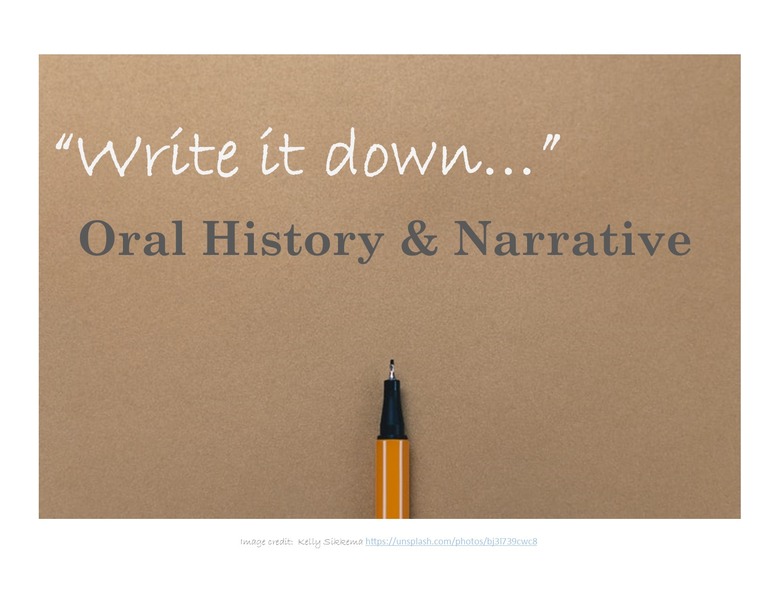- Author:
- Mandy Palmer
- Subject:
- Creative Writing, English Language Arts
- Material Type:
- Homework/Assignment
- Level:
- Academic Lower Division
- Tags:
- License:
- Creative Commons Attribution Non-Commercial Share Alike
- Language:
- English
University of North Carolina Chapel-Hill Writing Center: Oral History
"Write it down...": Oral History & Narrative Assignment

Overview
An oral history narrative mini-project that can be used in, for example, an English or Humanities course. Calls for students to present a "snapshot" of their pre-COVID-19 day and asks them to reflect on how their lives have changed. Includes links to related articles/readings.
Overview
Narrative is a form of writing often used to record first-person accounts of or reactions to events. We are still in the midst of a unique time now to be experiencing a global pandemic. One professor suggests that individuals should keep a record of their daily lives during this event.
University of Virginia Professor Herbert "Tico" Braun says, "There is much that all of us and each of us have already experienced in the past few weeks that is shocking, unexpected, unpredictable, unknowable, new; much that we have not felt before and not seen. What is it like to live today knowing that we do not know what tomorrow and the day after will bring?"
Oral history is an important element in any study of the Humanities. The accounts of individuals who lived during and through previous historical events are useful in helping us learn from our past.
For this assignment, you are going to record a bit of your own personal experience in a single-page "snapshot." We will then discuss a selection of the projects in a future class assignment.
Works Cited
Bromley, Anne E. "'Write it Down': Historian Suggests Keeping a Record of Life During Pandemic." UVA Today, https://news.virginia.edu/content/write-it-down-historian-suggests-keeping-record-life-during-pandemic Accessed 20 March 2020. Link updated 18 October 2024.
Mini Project Instructions
Humanities Mini Project Instructions: A Snapshot
Oral History & COVID-19

image credit: https://stocksnap.io/photo/concept-coronavirus-4WMLGD6OKN
In the article by Ann Bromley, professor Braun is quoted as saying:
When you think about the individual in this pandemic, think of yourself and you can write about yourself, think and write about other individuals, and about your relationships to others, to your society, societies, to your loved ones, your friends, your institutions.
When you think about society, think about parts of it; death, disease, Wuhan province, the Chinese government, medical systems, Italy, the stock market, shaking hands, online classes, isolation, your town, your family, rich people and poor, social distancing, public events, the market, vulnerabilities, hoarding, hospitals, politicians, health insurance, selfishness, fear, sick leave, economic policies, exponential expansion, individualism, cooperation, competition, solidarity … and more.
For this Mini Project you will need to read through the articles linked in the Overview. You will then craft a one-page/slide "snapshot" of yourself as you are experiencing this historical event.
Come up with a minimum of two paragraphs that briefly present a "snapshot" of what the past year has been like for you since you first heard of the Coronavirus or COVID-19. How is your typical day different? What has changed for you?
Some ways to approach this oral history project:
- Look back through your photos - What were you doing around this time last year?
- Look back through your calendar - Were there any significant events this time last year? Would they be different if they occurred now?
- If you keep a journal or diary, this would provide a good source of comparison information for you.
- Have you made any new goals? Why did you make new goals? How is that going?
Your project will be graded on following the assignment, structure, flow, correct grammar usage, insight, visual appeal, and clarity.